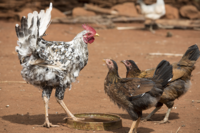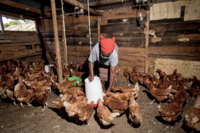Libourne, 7th April 2021 - An ambitious new 4-year project aims to help 150,000 small-scale poultry producers in Africa to become more productive and efficient by building their businesses and overall sustainability. The PREVENT project (PRomoting and Enabling Vaccination Efficiently, Now and Tomorrow) will see more than 50 million hatchery-vaccinated day-old chicks distributed annually.
Improvement in poultry production is one of the most promising options to provide affordable protein and other essential nutrients to Africa’s rapidly growing population. Each year, Africa’s population grows by the equivalent of another France (or Thailand) and is projected to double to around 2.5 billion people by 2050. Currently, more than 250 million people in Africa are undernourished and almost one billion cannot afford a healthy diet. The trends for both are upwards.
The PREVENT project, a partnership between Ceva Santé Animale (a global veterinary health company) and GALVmed (a not-for-profit that makes livestock vaccines, medicines and diagnostics accessible to small-scale producers), with the support of the Bill & Melinda Gates Foundation, will work with 36 medium-sized hatcheries spread across eight Africa countries. The project will enable the hatcheries to provide high-quality, vaccinated day-old chicks to small-scale producers together with practical advice and guidance from a team of field technicians.
To date, the effectiveness of poultry vaccination in Africa has been limited. High temperatures hamper distribution of vaccines, which mostly need to be kept cold. Combined with lack of information about circulating infectious diseases, rural producers can have their flocks and livelihood wiped out overnight.
By providing small-scale producers with better quality chicks, which are already effectively protected from the major infectious poultry diseases before they arrive on the farm, together with improved flock health and husbandry advice, the project aims to cut waste and make poultry production across the target countries much more sustainable.
Currently, major animal health businesses, such as Ceva, focus their vaccine marketing efforts on large-scale hatcheries. This project will enable Ceva, which is co-funding the project, to expand its focus to include medium-sized hatcheries and therefore extend the benefits of rearing hatchery-vaccinated chicks to more small-scale poultry producers.
Today, the absence of local technical support is also a major block to improving the efficiency of poultry production. Field technicians will serve as the link between the hatcheries and producers, as well as providing advice and technical support, they will also distribute vaccinated chicks to smaller-scale producers giving them equal opportunity to grow their businesses.
The project plans to be gender transformative by aiming to have women actively participate in 60% of the small-scale poultry enterprises targeted.
Finally, the large-scale and geographically dispersed nature of the project will offer unprecedented levels of access and insight into the emerging commercial poultry sector in Africa. It is hoped that the information generated and shared by the project will encourage other businesses, such as feed, genetics and equipment suppliers to invest and support the sector.
Enrique Pando, GALVmed’s Director for Commercial Development said:
"GALVmed is committed to accelerating the availability of technologies that are beneficial for small-scale producers. We are happy to be part of this collaboration that will increase small-scale poultry producers’ access to healthy day-old-chicks, enabling them to reduce their production costs, expand their businesses and substantially increase their profit margins while improving their quality of life.”
For Ceva, Dr. Pierre-Marie Borne, Public Health Director and Ceva’s lead for the project commented:
“The PREVENT project will make the latest technological innovations, such as, hatchery-vaccinated day-old chicks and technical support available to small-scale poultry farmers across Sub-Saharan Africa. This will strengthen and broaden poultry production in rural areas, enhancing the capacity of smaller farmers to respond to the enormous challenge of producing enough high-quality protein to meet the needs of Africa’s rapidly growing population.”
>> Download PDF
>> Download free of rights images: Click here
-----
About Ceva Santé Animale:
Ceva Santé Animale is a French multinational veterinary pharmaceutical company created in 1999. Chaired by Dr. Marc Prikazsky, Ceva specializes in the research, development, production and marketing of pharmaceutical products and vaccines for livestock (ruminants, swine, poultry) and companion animals. Ceva is present in 110 countries and employs over 6000 people worldwide.
Website: www.ceva.com
Contact: Martin Mitchell - Group Communication Director
+33 (0)5 57 55 40 80 - martin.mitchell@ceva.com
About GALVmed:
GALVmed works with partners to make livestock vaccines, medicines and diagnostics accessible and available to millions of smallholder farmers in developing countries who depend on livestock for their livelihood. The international not-for-profit company aims to make a significant contribution towards transformational change in the smallholder livestock health landscape by developing a portfolio of high-impact products and initiating a range of private sector market initiatives operating at scale in the smallholder sector in Africa and South Asia. GALVmed is headquartered in Edinburgh, Scotland with regional offices in Nairobi, Kenya and New Delhi, India.
Website: www.galvmed.org

 Corporate Website
Corporate Website
 Africa
Africa
 Argentina
Argentina
 Asia
Asia
 Australia
Australia
 Belgium
Belgium
 Brazil
Brazil
 Bulgaria
Bulgaria
 Canada (EN)
Canada (EN)
 Chile
Chile
 China
China
 Colombia
Colombia
 Denmark
Denmark
 Egypt
Egypt
 France
France
 Germany
Germany
 Greece
Greece
 Hungary
Hungary
 Indonesia
Indonesia
 Italia
Italia
 India
India
 Japan
Japan
 Korea
Korea
 Malaysia
Malaysia
 Mexico
Mexico
 Middle East
Middle East
 Netherlands
Netherlands
 Peru
Peru
 Philippines
Philippines
 Poland
Poland
 Portugal
Portugal
 Romania
Romania
 Russia
Russia
 South Africa
South Africa
 Spain
Spain
 Sweden
Sweden
 Thailand
Thailand
 Tunisia
Tunisia
 Turkey
Turkey
 Ukraine
Ukraine
 United Kingdom
United Kingdom
 USA
USA
 Vietnam
Vietnam



